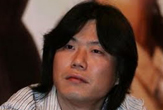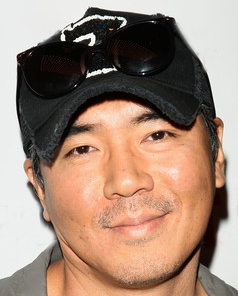Hangul Celluloid’s one-on-one interview with director Kim Ji-woon, which took place at the Korean Cultural Centre UK on Saturday 6th November 2010 at 3.30pm:
 |
Kim Ji-woon - 김지운
Born: May 23, 1964
Nationality: South Korea
Occupation: Director, screenwriter |
|
Filmography: I Saw The Devil (2010), The Good, The Bad, The Weird (2008), A Bittersweet Life (2005), A Tale Of Two Sisters (2003), Three - Segment: Memories (2002), Coming Out (2000), The Foul King (2000), The Quiet Family (1998) |
Hangul Celluloid: ‘I Saw The Devil’ has been the subject of a lot of controversy since its completion, having twice been given a "restricted"/"limited" rating. As you have previously described the film as a hardgore revenge thriller, what were your expectations on submitting it for rating classification? Did you think that there might possibly be ratings issues?
Kim Ji-woon: As the film is a cruel and brutal hardgore thriller, there are obviously many violent and gory scenes, but I hadn’t anticipated that these would be problematic because I had standardised all my scenes based on references from commercial and imported films. It wasn’t made fundamentally just to be gory or shocking - the main central theme of the film is actually revenge and the utter extent and emptiness of revenge in humans - and the violence simply played a part in telling the story rather than being the focus. Within the film, I attempted to show the truthful emotions of the protagonists throughout their journey and since in England the uncensored version is being shown, and in Canada the age limit of 14 was given, I think that the problems in Korea arose because there are so many brutal scenes with some of the country’s major actors that they were seen as much more shocking there than they were in other countries.
Hangul Celluloid: Do you feel that the controversy has affected cinema attendance of the film in Korea, and subsequently abroad?
Kim Ji-woon: If anything, I feel the controversy will actually boost cinema attendances abroad but, in Korea, there were so many rumours of brutality and violence, and with so many female audiences in Korea, I think that they were somewhat put off seeing the film, so the rumours definitely had an adverse affect there. The ending of the film is, obviously, not happy and Korean audiences tend to like happy endings, so the film fanatics loved it but for the ordinary spectators, I think that the less than happy ending had an effect on sales as well. In film reviews in Korea, they have also mostly concentrated on the gore and violence, but there have been a couple of reviews which mentioned that there were some beautiful moments within the film and this was a very happy moment for me.
Hangul Celluloid: ‘I Saw The Devil’ stars Lee Byung-hun, whom you have worked with on ‘A bittersweet Life’ and ‘The Good, The Bad, The Weird’; and Choi Min-sik, who you worked with on ‘The Quiet Family’. Could you tell me about the casting of the film, and the decisions which led to the casting of the particular roles?
Kim Ji-woon: Yes, this was the second time I’ve worked with Choi Min-sik, but this time the scenario of the film wasn’t directly mine - it was originally based on a different scenario. Usually it’s the director who casts an actor, but in this case it was the actor who cast the director and Choi Min-sik proposed the scenario to me first, and from the first time that I read it, I loved it – it was so brutal and showed that innate human toughness – and I was compelled by how to show this in a cinematic frame. In Korea, Choi Min-sik is the most energetic and passionate actor and to find someone to match him I decided on Lee Byung-hun - who plays cold-hearted roles incredibly well - and it was interesting to me to see how these opposing poles would meet and what the results would be, and it turned out to be a great opportunity to show these great actors’ skills.
Hangul Celluloid: A lot of your earlier films, such as A Tale of Two Sisters and Memories, deal with psychological issues and the effect of outside forces on a person’s mental state. Did you also relate these ideas to your direction of ‘I Saw The Devil’.
Kim Ji-woon: I am particularly interested in the dark side of human nature and showing the darkness which humans are capable of, especially the reactions and changes caused when things don’t turn out the way we had anticipated, or the way that we wanted them to and I have always tried to use the genre of each film to show these changes, and this is also the case in ‘I Saw The Devil’.
Hangul Celluloid: It is generally believed that your next project will be directing a Hollywood film called ‘The Last Stand’. What are your feelings about working on an American project?
Kim Ji-woon: Making an American film is not a dream of mine at all, it’s simply that having made a lot of films in Korea, an appeal has built in Hollywood and the offer just came about. For me personally, I’m really thinking of it as a different take and a different perspective and since ‘I Saw The Devil’ had so many problems, it will be refreshing for me to try a different environment.
Hangul Celluloid: I think they’re asking me to wrap things up, but as a final question, I’d like to ask when you are directing a film, is the script pretty much set from the outset or do you allow spontaneous changes to occur? For example, in ‘The Good, The Bad, The Weird’ there are so many tiny, but incredibly funny moments, were they all decided in advance?
Kim Ji-woon: Nearly everything I direct features in the script from the very beginning. Even in my film ‘The Good, The Bad, The Weird’, which has easily the most funny moments of any of my films, all of them were set long before I started shooting it. In that film, I really wanted to focus on both the parodies and the action and therefore I wanted even the smallest humourous moment to be decided before directing began.
Hangul Celluloid: Thank you very much for taking the time to talk to me.
I would like to sincerely thank Paul Koren, the Korean Cultural Centre UK and The London Korean Film Festival for giving the opportunity to interview director Kim Ji-woon.
A special thanks also goes to An Ji-yoon, who worked as the translator in the interview. She put up with my overlong ramblings, as well as my going off on tangents, and did an exemplary job.



